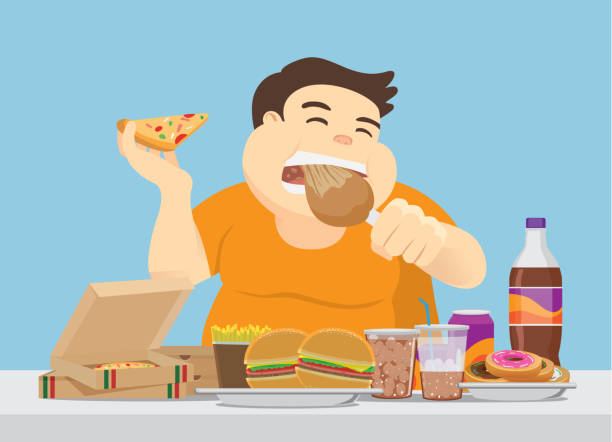Do you eat too much? If so, you might be suffering from a medical condition known as “excessive eating.” This is a condition that is characterized by overeating and excessive weight gain. It can be very harmful to your health, and it is important to get treatment if you think you might be suffering from it. In this blog post, we will discuss the symptoms of excessive eating, as well as the treatments that are available for it.
Contents
Defining Excessive Eating Medical Term

The medical term for overeating is “binge eating disorder” (BED). Binge eating disorder is a serious, life-threatening eating disorder characterized by episodes of binge eating.
It is defined as consuming an unusually large amount of food in a short period and feeling out of control during the episode. Binge eating disorder is the most common eating disorder in the United States.
Consequences Of Excessive Eating
The medical term for overeating is “hyperphagia,” and it can have some serious consequences. People with hyperphagia may eat to the point of nausea or vomiting, and they often eat much more quickly than normal. This can lead to weight gain, as well as other health problems like high blood pressure and diabetes.
Hyperphagia can be caused by several different things, including medical conditions like Prader-Willi syndrome or genetic disorders. But in many cases, the cause is simply unknown. If you think you or someone you know may be struggling with hyperphagia, it’s important to talk to a doctor or mental health professional. They can help you get the treatment you need to manage the condition.
What Are The Causes Of Excessive Eating?

Various causes of excessive eating. It includes:
A person’s psychological state
Some people overeat as a way to deal with their emotions. This is often seen as a form of self-medication, where food is used as a way to cope with stress, anxiety, or depression.
Biological factors
Certain hormones and chemicals in the body can trigger overeating. For example, the hormone ghrelin is known to stimulate appetite, while leptin is responsible for telling the brain when we’re full.
Certain medical conditions
Certain medical conditions can lead to overeating. These include things like hypothyroidism, insulin resistance, and polycystic ovary syndrome.
Hypothyroidism: This is a condition where the thyroid gland doesn’t produce enough hormones. This can lead to fatigue, weight gain, and constipation — all of which can increase the likelihood of overeating.
Insulin resistance: This occurs when the body becomes resistant to insulin, a hormone that helps regulate blood sugar levels. When this happens, blood sugar levels can become erratic, which can lead to cravings and overeating.
Polycystic ovary syndrome: This is a hormonal disorder that can cause weight gain, insulin resistance, and inflammation. These factors can all contribute to overeating.
Hypoglycemia: The medical term for low blood sugar. When your blood sugar drops too low, it’s called hypoglycemia.
Symptoms include feeling shaky, sweating, having trouble concentrating, and feeling hungry. If you have diabetes, you’re at risk for hypoglycemia if you take insulin or other diabetes medications that can lower your blood sugar. You can also have hypoglycemia if you don’t eat enough or if you exercise too much.
If you have diabetes and you’re having hypoglycemia, it’s important to check your blood sugar level right away. If it’s below 70 mg/dL (milligrams per deciliter), you’ll need to treat it. You can treat hypoglycemia with sugar, food, or fluids. You might need to have someone else help you because you might not be able to treat yourself if your blood sugar is very low.
If you’re having trouble treating your hypoglycemia or if your blood sugar level drops below 50 mg/dL go to the emergency.
Medications
Some medications can cause increased appetite or cravings, which can lead to overeating. These include things like antidepressants, steroids, and certain blood pressure medications.
Environmental factors
Our environment can also play a role in excessive eating. This includes things like having easy access to food, being around others who are eating or being exposed to advertising for unhealthy foods.
If you find yourself overeating regularly, it’s important to talk to your doctor. They can help you determine if there’s an underlying cause and come up with a plan to help you stop. Overeating can lead to serious health problems, so it’s important to get help if you need it.
How To Diagnose It?
To diagnose excessive eating, your doctor will ask you about your medical history and perform a physical exam. They may also order blood tests to check for hormonal imbalances or other conditions that can trigger overeating. If no underlying cause is found, you may be diagnosed with compulsive overeating disorder.
For Diabetes: Diagnoses for diabetes usually require a fasting blood glucose test or AIC test. The fasting blood glucose test measures your blood sugar after you have fasted for at least eight hours. The AIC test is similar, but it also measures insulin levels. If either of these tests shows high levels of sugar or insulin, you may be diagnosed with diabetes.
For hypothyroidism: A simple blood test can measure your hormone levels to see if you have hypothyroidism. If you do, treatment is usually a matter of taking daily thyroid hormone pills.
Thus there is various diagnosis and treatment for excessive eating, depending on the root cause. If you think you may be overeating, talk to your doctor about your options.
Treatment Options for Excessive Eating

The first step in treating excessive eating is to identify the underlying cause. If the cause is due to an emotional disorder, such as depression or anxiety, then treatment will focus on addressing those issues. If the cause is due to a physical condition, such as a thyroid imbalance, then treatment will focus on correcting that issue.
There are various treatment options available for excessive eating, and the best course of action will vary depending on the underlying cause. If the cause is emotional, then therapy and/or medication may be recommended. Identify your triggers: Pay attention to when, where, and why you overeat. Once you identify your triggers, you can work on avoiding them or finding healthy ways to cope with them.
Seek professional help
If you’re struggling to make lifestyle changes on your own, talk to a registered dietitian or a therapist who specializes in eating disorders. They can help you develop a plan to overcome overeating and develop healthy eating habits.
Medication: Certain medications can cause overeating as a side effect. If you think your medication may be to blame, speak to your doctor about changing prescriptions.
Psychological disorders: Some psychological disorders can lead to excessive eating. These include things like depression, anxiety, and stress. If you think your mental health may be contributing to your overeating, please reach out to a professional for help.
Therapy
There is various therapy that can help people with overeating disorders. One form of therapy is called Dialectical behavioral therapy (DBT).
This type of therapy helps patients become more aware of their thoughts and actions. DBT also teaches skills to cope with difficult situations without resorting to food.
Other types of therapies used to treat overeating disorders include cognitive behavioral therapy (CBT), interpersonal therapy, and family therapy.
The goal of therapy is to help the patient develop a healthier relationship with food. Patients learn how to cope with their emotions without using food as a crutch. They also learn how to make better choices when it comes to what they eat. Therapy can be an important part of treatment for overeating disorders.
Lifestyle Changes
If you’re struggling with overeating, making some lifestyle changes can help you get your eating under control. Here are a few suggestions:
- Get regular exercise: Exercise can help reduce stress and anxiety, both of which can trigger overeating.
- Eat regular meals: Skipping meals can make you more likely to overeat later in the day.
- Avoid dieting: Crash dieting is a common trigger for binge eating.
Making even small changes in your lifestyle can make a big difference in your ability to control your overeating. If you’re struggling to make changes on your own, seek professional help. With the right support, you can overcome overeating and develop healthy eating habits.
Conclusion
It may be concluded that excessive eating medical term that can be used to overeat. It is a good idea to be aware of this term and to use it when needed. This will help you avoid any potential health risks that are associated with overeating.
If you or someone you know is struggling with an eating disorder, please seek professional help.
For further information and suggestions, please contact Therapy Mantra. We have a team of expert therapists and psychiatrists that can help you overcome this problem. Get in touch with us right away to learn more about our services. You may also make an online therapy session or download our free Android or iOS app.


